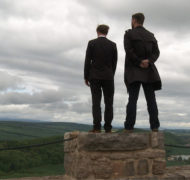Disruption in the Legal Profession
Small Group Study / Produced by TOW Project
This lesson is part of Issues Christian Lawyers Face, a study guide produced by The Theology of Work Project in partnership with Steven Moe, for the New Zealand Christian Lawyers national conference in May 2017. Click the Table of Contents on the right of this page to see the entire curriculum.
Introduction
What does disruption mean for the legal profession and our jobs/role/identity?
Case study
Lucy is reading yet another article about “disruption” and how it will impact professional services firms. The article is headed “Will you be replaced by an AI robot?”. It talks a lot about different technologies which can read every court case and give accurate predictions on fact situations. She inwardly scoffs at the very idea and turns on to another article.
That night she is having dinner with a friend, who tells her she has just lost her job at a law firm where she had been working in a corporate team. Her friend explains, “they decided to automate all the precedents and train up more legal executives in how to select the appropriate clauses to insert – they can pay them less and churn a lot more work that way and they just need one senior person to oversee them all.” Lucy sips her drink and begins to rethink her views on that article she had been reading earlier.
Questions for Discussion
- What do you identify with in this story, and why?
- How are you seeing disruption affecting your role?
- How do we adapt and deal with changes to our profession and potentially the roles we have traditionally played as lawyers with the advent of new technology?
Biblical reflection
Nobody, not even Christians, can predict the future:
Come now, you who say, “Today or tomorrow we will go to such and such a town and spend a year there, doing business and making money.” Yet you do not even know what tomorrow will bring. What is your life? For you are a mist that appears for a little while and then vanishes. Instead you ought to say, “If the Lord wishes, we will live and do this or that.”
(James 4:13-15)
At the same time, Jesus encourages his followers not to worry about the future:
“Therefore I tell you, do not worry about your life, what you will eat or what you will drink, or about your body, what you will wear. Is not life more than food, and the body more than clothing? Look at the birds of the air; they neither sow nor reap nor gather into barns, and yet your heavenly Father feeds them. Are you not of more value than they? And can any of you by worrying add a single hour to your span of life? And why do you worry about clothing? Consider the lilies of the field, how they grow; they neither toil nor spin, yet I tell you, even Solomon in all his glory was not clothed like one of these. But if God so clothes the grass of the field, which is alive today and tomorrow is thrown into the oven, will he not much more clothe you – you of little faith? Therefore do not worry, saying, “What will we eat?’ or ‘What will we drink?’ or What will we wear?’ For it is the Gentiles who strive for all these things; and indeed your heavenly Father knows that you need all these things. But strive first for the kingdom of God and his righteousness, and all these things will be given to you as well. So do not worry about tomorrow, for tomorrow will bring worries of its own. Today’s trouble is enough for today.”
(Matthew 6:25-34)
Not worrying about the future when you don’t know what it will bring can be a hard pill to swallow. It was hard for the Jewish people exiled in Babylon, so they participated in life there half-heartedly, hoping to leave the first chance they got. Jeremiah told them to stop listening to false prophets and to instead focus on living in the present:
Thus says the Lord of hosts, the God of Israel, to all the exiles whom I have sent into exile from Jerusalem to Babylon: Build houses and live in them; plant gardens and eat what they produce. Take wives and have sons and daughters; take wives for your sons, and give your daughters in marriage, that they may bear sons and daughters; multiply there, and do not decrease. But seek the welfare of the city where I have sent you into exile, and pray to the Lord on its behalf, for in its welfare you will find your welfare. For thus says the Lord of hosts, the God of Israel: Do not let the prophets and the diviners who are among you deceive you, and do not listen to the dreams that they dream… For surely I know the plans I have for you, says the Lord, plans for your welfare and not for harm, to give you a future with hope.
(Jeremiah 29:4-8,11)
God’s plan didn’t look like the future the exiles were expecting. And yet God would make it work for them, promising prosperity and hope. God also offers you a future with hope. It may or may not look like what you expect.
Discuss: What are the key principles from this study that could be applied in your situation?
For more on living with an uncertain future, see the Theology of Work Project articles on Proverbs 31:25 and Job 1:13-22. Or take a look at this newsletter called Changing Jobs Ready or Not.





